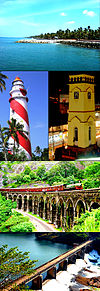
The Kingdom of Travancore, also known as the Kingdom of Thiruvithamkoor or later as Travancore State, was kingdom that lasted from c. 1729 until 1949. It was ruled by the Travancore Royal Family from Padmanabhapuram, and later Thiruvananthapuram. At its zenith, the kingdom covered most of the south of modern-day Kerala and the southernmost part of modern-day Tamil Nadu with the Thachudaya Kaimal's enclave of Irinjalakuda Koodalmanikyam temple in the neighbouring Kingdom of Cochin. However Tangasseri area of Kollam city and Anchuthengu near Attingal in Thiruvananthapuram were parts of British India.

Kollam, is an ancient seaport and the fourth largest city in the Indian state of Kerala. Located on the southern tip of the Malabar Coast of the Arabian Sea, the city is on the banks of Ashtamudi Lake and is 71 kilometers northwest of the Thiruvananthapuram. Kollam is one of India's oldest continuously inhabited cities, with evidence of habitation stretching back to the megalithic; the city has also been a maritime entrepôt millennia, the earliest attestation of which dates back to the Phoenicians and Romans. It is the southern gateway to the Backwaters of Kerala, and is known for its cashew processing, coir manufacturing, and tourism industries.
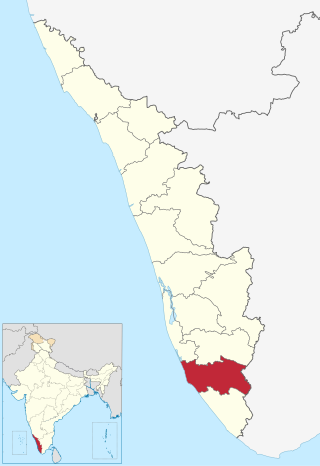
Kollam district, is one of 14 districts of the state of Kerala, India. The district has a cross-section of Kerala's natural attributes; it is endowed with a long coastline, a major Laccadive Sea seaport and an inland lake. The district has many water bodies. Kallada River is one among them, and land on the east bank of the river is East Kallada and that on the west bank is West Kallada.

Velayudhan Chempakaraman Thampi ofThalakulam (1765–1809) was the Dalawa or Prime Minister of the Indian kingdom of Travancore between 1802 and 1809 during the reign of Bala Rama Varma Kulasekhara Perumal. He is best known for being one of the earliest individuals to rebel against the British East India Company's authority in India.
The Thiruvananthapuram - Shoranur canal is a historic canal in India, from Trivandrum to Shoranur. It was one of the most arterial transportation mode in erstwhile Travancore princely state. Most of the trade, commerce and freight traffic in Travancore used to happen through this canal. The canal used to pass through rice bowl of the state, Kuttanad, centre of Coir trade i.e. Alappuzha, centre of Cashew business, Kollam, Changanassery market, strategic Thevally, Kayamkulam, Varkala etc. and used to connect Thiruvithamkoor with Cochin State and Malabar.

Perumpuzha is a small suburban town in Kollam district of Kerala, India.The junction is the meeting place of Kottiyam-Kundara & Kollam-Veliyam roads. Distance from Kollam city is about 16 km. Near to the town junction there is a market called Perumpuzha market. Assisi Attornment Hospital is just one or two minutes walk from the junction. A three-minute walk from junction towards north, a cashew factory is there. Previously it was under the Dalmia Management. The local name for the company was 'Sayippinte Company'. But now it is under CAPEX.
Elampalloor is an urban village in Kollam district in the state of Kerala and is a part of Kollam Metropolitan Area, India. It is 12 km away from Kollam city, 23 km away from Paravur and 13 km away from Kottarakkara.

Perinad is a village in Kollam district in the state of Kerala, India. As of 2001 India census, Perinad had a population of 32,864 with 16,032 males and 16,832 females.
Mannadi is a village in Kadampanad grama panchayat at Adoor Taluk, Pathanamthitta District of Kerala, India.
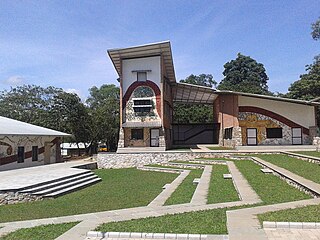
Chandanathope is a town located in Kollam district, Kerala. It lies 23 kilometres (14 mi) from Paravur town and 8 kilometres (5.0 mi) from Kollam city centre on the Kollam–Thirumangalam National Highway 744. In Malayalam, the name denotes a place with sandalwood plantations. It is also known for cashew processing and its exports two major cashew exporters of Kollam namely VLC Cashews and MARK has their facilities in the town.
Kanjiracode in Kundara lies on the banks of the Kanjiracodu Kayal of Kollam district in Kerala, India.
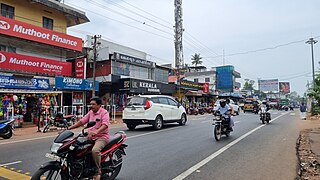
Keralapuram is an suburban area in Kollam District of Kerala, India and a part of Kollam City. Keralapuram is famous for numerous cashew factories in the region. It is split into Kottamkara Panchayath and Perinad Panchayath by the National Highway. In Kerala state legislative assembly elections, Keralapuram votes for Kundara Assembly constituency.
The Travancore rebellion against the British East India Company was led by the prime ministers of the Indian states of Travancore and Cochin in 1808–09 with support from Sikhs ruling Punjab.
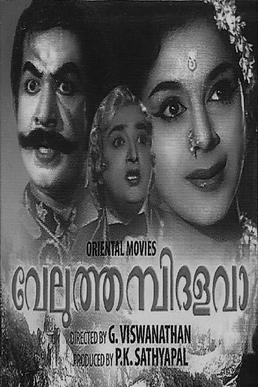
Veluthampi Dalawa is a 1962 Malayalam-language historical drama film based on the life of Velu Thampi Dalawa, the Dewan of Travancore during the first decade of 19th century, was one of the first to rebel against the British East India Company's supremacy. The film, directed by G. Viswanath and written by Jagathy N. K. Achary was shot in Newton Studios. Kottarakkara Sreedharan Nair, Thikkurissy Sukumaran Nair, Prem Nawas, Adoor Bhasi, G. K. Pillai, Ragini, Ambika Sukumaran and Sukumari portrayed prominent roles. The dances were choreographed by Chinni and Sampath along with Kalamandalam Madhavan. The film was a box office success.

Kundara railway station is an NSG–6 category Indian railway station in Madurai railway division of Southern Railway zone, serving the city of Kollam. It serves Kundara, located in Kollam district of the Indian state of Kerala. The station is one among the four railway stations serving the city of Kollam. Other railway stations in the city are Kollam Junction railway station,Kilikollur railway station and Eravipuram railway station.

The Battle of Quilon was fought on 15 January 1809 at Cantonment Maidan in Quilon, an important port city and business hub on the southwest coast of India. The conflict involved troops of the Indian kingdom of Travancore, led by the then Dewan of Travancore, Velu Thampi Dalawa, and a detachment of the British East India Company under Colonel Chalmers. The battle lasted for only six hours and is closely associated with the social and political history of Kerala.
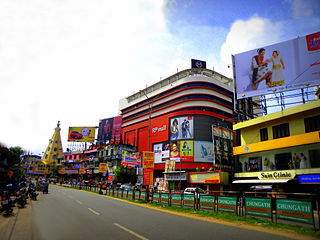
Kollam or Quilon is an old seaport and a city on the Laccadive Sea coast in Kerala, India, on Ashtamudi Lake. The city remains notable as the ancient commercial capital of Kerala and the southwestern Indian coast, in addition to its fame as the "Cashew Capital of the World". The Kollam Municipal Corporation has the second largest budget in Kerala in terms of revenue and expenditure.

Transport in Kollam includes various modes of road, rail and water transportation in the city and its suburbs. State-owned Kerala State Road Transport Corporation buses, private buses, Indian Railways, state-owned Kerala State Water Transport Department boats & ferry, taxis and auto rickshaws are serving the city of Kollam. The city had a strong commercial reputation since the days of the Phoenicians and Romans. Ibn Battuta mentioned Kollam Port as one of the five Indian ports he had seen during the course of his twenty-four year travels.
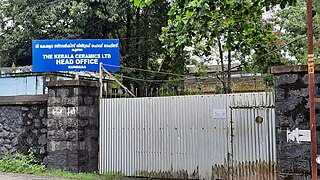
The Kerala Ceramics Limited is a fully owned Government of Kerala ceramics products manufacturing company, situated at Kundara in Kollam city, India. The company produce earthenware and spray dried coating grade as well as filler grade Kaolin for paint, paper manufacturing industries.
Technopark, Kollam is an industrial park in Kundara, Kollam, It is a satellite park of Technopark that is situated 63 km away from the Trivandrum Campus. This is the first district level IT Park established in Kerala. The Technopark Kollam is situated in44.47 acres (18.00 ha) of land beside Kanjiracode Lake. This park is developed as a Special Economic Zone.

















